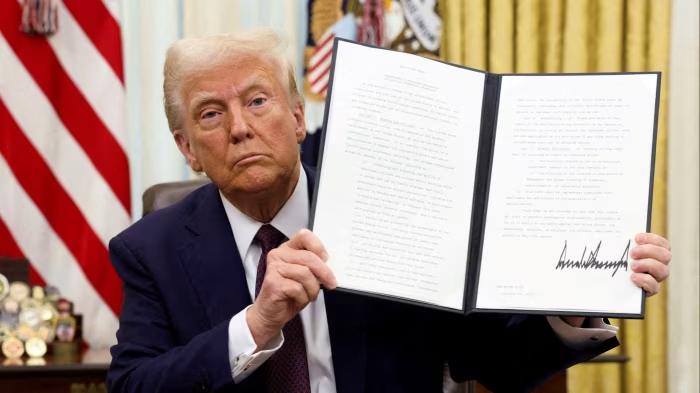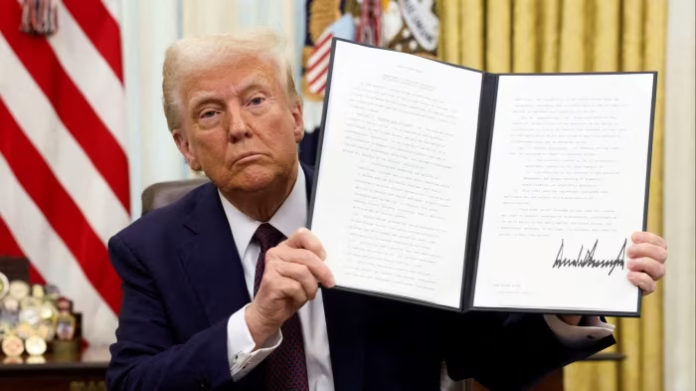
Washington, D.C. – July 8, 2025 — American President Donald Trump has once again delayed the beginning of huge new tariffs on imported goods from 14 nations, postponing the deadline to August 1st. While the White House framed this delay as a goodwill gesture aimed at fuelling trade talks, the administration was firm that the tariffs remain on course to begin if no bilateral agreements are reached in the weeks to come.
The 25% to 40% tariff rates are part of a bigger “reciprocity strategy” of the Trump administration — a policy aimed at fighting imbalances in trade and protecting American industries, particularly its manufacturing industries, steel, automobiles, and agriculture. Target countries are advanced economies like Japan and South Korea and several emerging markets in Asia, Africa, and Europe.
Who’s on the List?
These are among the most affected countries:
- Japan and South Korea: Both nations are hit with scheduled 25% taxes on a litany of items including electronics, automobiles, and steel.
- Thailand, Cambodia, Laos, Myanmar, Bangladesh, and Indonesia: Exposure to still higher rates between 32%–40% on textiles, agriculture, and consumer electronics.
- South Africa, Serbia, and Malaysia: Waiting for 28% to 35% tariff.
Additional focus is also being given to India and Turkey, although no real tariff rates have been made public for them at this time.
Vietnam and Britain have been the only nations to have signed exemption agreements to date — a significant milestone that other nations will closely observe.
The Economic and Political Implications
The decision has already drawn vehement responses from financial markets and foreign countries. S&P 500 dropped 0.8% as investors started to fear supply disruptions globally, and Japanese automakers’ shares like Toyota and Honda dropped as well.
Asian and European governments are now under pressure to reach trade talks with Washington before the deadline in August. Japan’s foreign ministry stated “deep concern” about the threat of tariffs, and South Korea dispatched a delegation to Washington to revive talks on existing trade deals.
Other governments are likewise calling for a response by the World Trade Organization (WTO), condemning the legality of what they call “punitive and unilateral” American trade actions.
From the Trump Strategy
President Trump has long subscribed to the opinion that America has been on the losing end of foreign trade agreements. In his most recent statements, he has been talking about a principle of “reciprocal fairness,” by which if a country uses a 30% tariff on American goods, the U.S. would have a right to do so as well.
“This is balancing things out,” his words last week at a rally stop in Michigan. “We’re not going to let other countries take advantage of American workers, American factories, and American values.”
It’s not a sign of weakness, White House Press Secretary Karoline Leavitt said, but “a last chance” for trade partners to have a seat at the negotiating table.
“We’re still determined to enforce these tariffs unless new and fair trade deals are signed,” she said in a CNN KFile interview.
Industry Reaction: Divergent Perspectives
U.S. industries remain divided on planned tariffs. Though some unions and steelmakers have been positive, citing jobs created and reduced import competition, supply-chain-reliant manufacturers and retailers warn that the tariffs would have a boomerang effect — raise costs and stoke inflation.
“This would save a small number of jobs in the short term but could harm millions of consumers and would cause massive disruptions to complex supply lines that American businesses depend on,” a U.S. Chamber of Commerce representative said.
Textile importers, electronics firms, and auto parts suppliers are among the sectors that would suffer if the taxes were made effective.
What’s Next?
It is negotiating with some countries and has made progress with others, including China and Japan. The European Union has signaled a desire to renegotiate aspects of its American trade relationship, but disagreements persist on access to American farming and environmental standards. India, a large pharmaceutical and software exporting nation, demands assurances before initiating formal talks.
Now, as its deadline of August 1 approaches, the globe waits to determine if America’s aggressive tariff plan produces new trade deals — or escalates into a bigger trade war.


